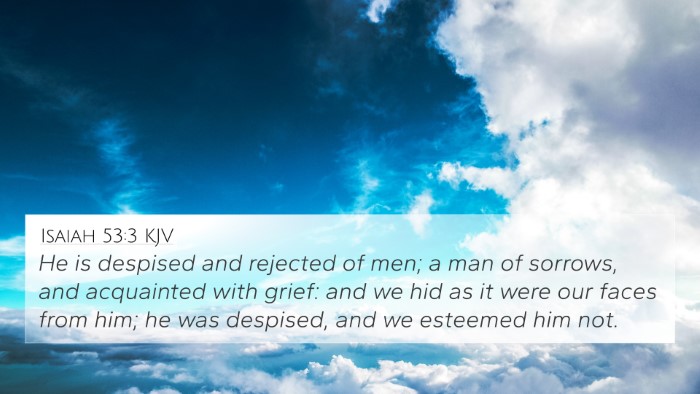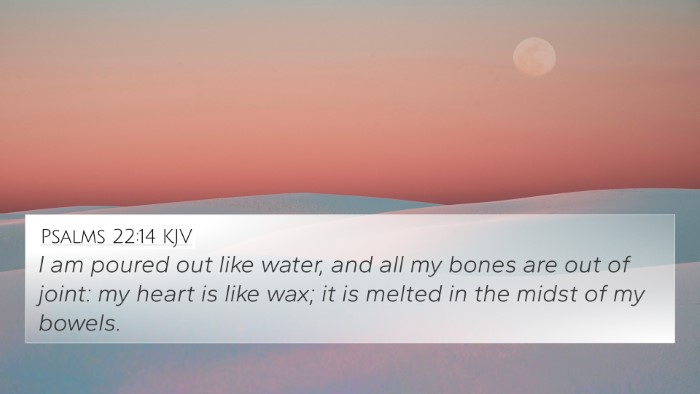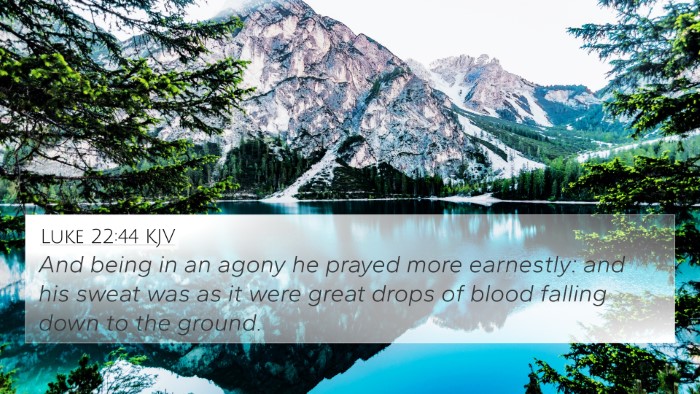Understanding Psalms 88:15
Psalms 88:15 states, “I am afflicted and ready to die from my youth up: while I suffer your terrors I am distracted.” This verse captures the deep anguish and despair felt by the psalmist, who articulates a sense of prolonged suffering and abandonment by God. Below is a combined interpretation synthesized from various public domain commentaries.
Context of the Verse
This psalm is a lament, where the psalmist expresses profound sorrow and a sense of hopelessness. The title of the psalm indicates it is a prayer, highlighting the distressful circumstances under which it was written. The verse serves as an integral part of this expression, emphasizing not only the physical and emotional pain but also the perceived distance from God.
Insights from Commentaries
-
Matthew Henry:
Henry emphasizes the emotional weight of this verse, stating that the psalmist's experience of affliction is constant and overwhelming. The reference to youth indicates that this suffering is not new but has been a part of the psalmist's life, suggesting a deep-rooted pain that has shaped their existence. The phrase "while I suffer your terrors" speaks to the internal struggle and turmoil caused by perceived divine wrath.
-
Albert Barnes:
Barnes explores the idea of being "distracted" as a result of intense suffering. He notes that the psalmist feels as if God's terrors have led to a mental and emotional disarray. This highlights the psychological aspect of suffering and suggests a struggle between faith and despair, as the psalmist is caught in a moment of intense internal conflict.
-
Adam Clarke:
Clarke focuses on the historical context of the psalm, pointing out that such utterances of despair were not uncommon among the saints of old. He notes that the affliction mentioned is indicative of a deep spiritual warfare, reflecting a believer’s struggle with sin, guilt, and the seeming absence of God’s assistance. This reinforces the theme of a believer feeling isolated and burdened under the weight of their sins.
Thematic Connections
This verse can be analyzed in the light of various other scriptures that deal with themes of suffering, despair, and perceived abandonment. Here are some relevant cross-references:
- Psalms 22:1: "My God, my God, why have you forsaken me?" – A cry that mirrors the despair reflected in Psalms 88:15.
- Job 30:20: "I cry out to you, God, but you do not answer; I stand up, but you merely look at me." – Another expression of feeling abandoned.
- Lamentations 3:1: "I am the man who has seen affliction by the rod of his anger." – A parallel lament about suffering.
- Isaiah 38:13: "I have made to myself a grave like a lion..." – Reflecting deep sorrow and the sense of isolation in suffering.
- Matthew 27:46: "My God, my God, why have you forsaken me?" – Jesus words on the cross resonate deeply with the emotional state of the psalmist.
- 2 Corinthians 1:8-9: Paul speaks of despaired life, which aligns with the sentiments found in Psalms 88:15.
- Philippians 4:6-7: While not written from a place of despair, this verse provides insight into finding peace amidst anxiety and suffering.
Bible Cross-Reference Insights
Cross-referencing Bible verses can help uncover deeper connections and themes throughout scripture. Psalms 88:15 emphasizes the importance of understanding emotional suffering as a part of the human experience. Here, we can explore:
-
Enhancing Bible Study: Tools for Bible cross-referencing, such as concordances and cross-reference guides, can offer invaluable assistance in studying verses that address similar themes of suffering and despair.
-
Methodology: Engaging in comparative Bible verse analysis allows believers to identify connections between scriptures that portray human anguish in light of divine presence or absence.
Conclusion
Psalms 88:15 stands as a stark recognition of human affliction, bridging the gap between profound despair and the longing for divine interaction. Through effective scriptural cross-referencing, one can find solace and understanding in how these biblical narratives interweave, illuminating the continued relevance of lament in the faith journey.












